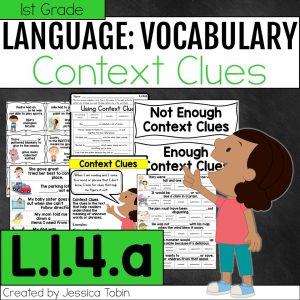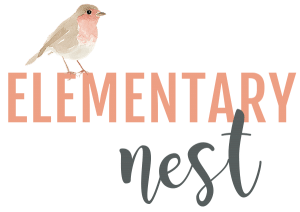Menu
Description
This 3rd and 4th Grade Summer ELA Activities pack is filled with ELA activities for 3rd and 4th graders. There are themed activities for each of the six Common Core Standards domains (RL, RI, L, SL, RF, and W). Your students will practice their ELA standards while incorporating the summer theme as well. This will take some of the stress off of your plate by providing you with standards-based and Common Core-aligned seasonal activities!
Each domain will have 3-4 activities or passages. The domains are Reading Literature, Reading Informational, Writing, Speaking and Listening, Language, and Foundational Skills. There will be a mix of hands-on partner, whole group, and independent activities.
Please check out the preview to get a clearer idea of all that you’re getting!
Summer Activities Included in 3rd and 4th Grade Summer ELA Activities:
Reading Literature: 4 passages
-
RL.3.5/RL.4.5- Story Structure
-
RL.3.6/RL.4.6- Point of View
-
RL.3.9/RL.4.9- Compare and Contrast
-
RL.3.4/RL.4.4- Figurative Language
Reading Informational: 4 passages
-
RI.3.4/RI.4.4- Unknown Words
-
RI.3.6/RI.4.8- Author’s Point and Reasons
-
RI.3.5/RI.4.7- Images in a Text
-
RI.3.9/RI.4.9- Compare and Contrast
Writing: 2 prompts and 2 partner activities
-
W.3.3/W.4.3- Narrative Writing
-
W.3.3/W.4.3- Narrative Writing
-
W.3.2/W.4.2- Informative Writing
-
W.3.2/W.4.2- Informative Writing
Speaking & Listening: 3 partner activities
-
SL.3.2/SL.4.2- Determine the Main Idea
-
SL.3.4/SL.4.4- Recount a Story
-
SL.3.6/SL.4.6- Speak in Complete Sentences
Language & RF: 3 partner activities and 1 independent activity
-
L.3.1.b/4th Review- Plural Nouns
-
L.3.1.i/L.4.1.f- Types of Sentences
-
RF.3.3.d/L.4.2.d- Irregularly Spelled Words
-
L.3.3.a/L.4.3.a- Word Choice
This summer set is part of a bundle. Want all of the themes?
This resource is an add-on to the ELA units I have created for Common Core. All of these activities are standards-based activities. What makes these unique is that they are themed to a holiday or a season!
-
These activities were created to be used alongside the ELA curriculum! If you’re interested in checking that curriculum out, click here for 3rd and click here for 4th!
This 3rd and 4th Grade Summer ELA Activities purchase is for one single classroom only.
If you would like to share with other classrooms, make sure to buy the extra licenses for a discount through the TeachersPayTeachers tool. If you are interested in a site license, please contact me for a quote at [email protected].
Standards covered in this particular unit:
RL
RL.3.5- Refer to parts of stories, dramas, and poems when writing or speaking about a text, using terms such as chapter, scene, and stanza; describe how each successive part builds on earlier sections.
RL.3.6- Distinguish their own point of view from that of the narrator or those of the characters.
RL.3.9- Compare and contrast the themes, settings, and plots of stories written by the same author about the same or similar characters (e.g., in books from a series)
RL.3.4- Determine the meaning of words and phrases as they are used in a text, distinguishing literal from nonliteral language.
RL.4.5- Explain major differences between poems, drama, and prose, and refer to the structural elements of poems (e.g., verse, rhythm, meter) and drama (e.g., casts of characters, settings, descriptions, dialogue, stage directions) when writing or speaking about a text.
RL.4.6- Compare and contrast the point of view from which different stories are narrated, including the difference between first- and third-person narrations.
RL.4.9- Compare and contrast the treatment of similar themes and topics (e.g., opposition of good and evil) and patterns of events (e.g., the quest) in stories, myths, and traditional literature from different cultures.
RL.4.4- Determine the meaning of words and phrases as they are used in a text, including those that allude to significant characters found in mythology (e.g., Herculean).
RI
RI.3.4- Determine the meaning of general academic and domain-specific words and phrases in a text relevant to a grade 3 topic or subject area.
RI.3.6- Distinguish their own point of view from that of the author of a text.
RI.3.5- Use text features and search tools (e.g., key words, sidebars, hyperlinks) to locate information relevant to a given topic efficiently.
RI.3.9- Compare and contrast the most important points and key details presented in two texts on the same topic.
RI.4.4- Determine the meaning of general academic and domain-specific words or phrases in a text relevant to a grade 4 topic or subject area.
RI.4.8- Explain how an author uses reasons and evidence to support particular points in a text.
RI.4.7- Interpret information presented visually, orally, or quantitatively (e.g., in charts, graphs, diagrams, time lines, animations, or interactive elements on Web pages) and explain how the information contributes to an understanding of the text in which it appears.
RI.4.9- Integrate information from two texts on the same topic in order to write or speak about the subject knowledgeably.
W
W.3.3- Write narratives to develop real or imagined experiences or events using effective technique, descriptive details, and clear event sequences.
W.3.2- Write informative/explanatory texts to examine a topic and convey ideas and information clearly.
W.4.3- Write narratives to develop real or imagined experiences or events using effective technique, descriptive details, and clear event sequences.
W.4.2- Write informative/explanatory texts to examine a topic and convey ideas and information clearly.
SL.3.2- Determine the main ideas and supporting details of a text read aloud or information presented in diverse media and formats, including visually, quantitatively, and orally.
SL
SL.3.4- Report on a topic or text, tell a story, or recount an experience with appropriate facts and relevant, descriptive details, speaking clearly at an understandable pace.
SL.3.6- Speak in complete sentences when appropriate to task and situation in order to provide requested detail or clarification. (See grade 3 Language standards 1 and 3 here for specific expectations.)
SL.4.2- Paraphrase portions of a text read aloud or information presented in diverse media and formats, including visually, quantitatively, and orally.
SL.4.4- Report on a topic or text, tell a story, or recount an experience in an organized manner, using appropriate facts and relevant, descriptive details to support main ideas or themes; speak clearly at an understandable pace.
SL.4.6- Differentiate between contexts that call for formal English (e.g., presenting ideas) and situations where informal discourse is appropriate (e.g., small-group discussion); use formal English when appropriate to task and situation. (See grade 4 Language standards 1 here for specific expectations.)
RF & L
L.3.1.b- Form and use regular and irregular plural nouns.
L.3.1.i- Produce simple, compound, and complex sentences.
L.3.3.a- Choose words and phrases for effect.*
RF.3.3.d- Read grade-appropriate irregularly spelled words.
L.4.1.f-Produce complete sentences, recognizing and correcting inappropriate fragments and run-ons.*
L.4.2.d- Spell grade-appropriate words correctly, consulting references as needed.
L.4.3.a- Choose words and phrases to convey ideas precisely.*












